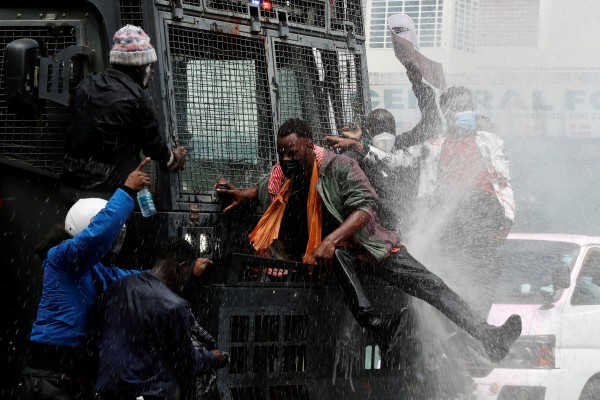NAIROBI: Police fired on demonstrators trying to storm Kenya’s legislature on Tuesday and at least five protesters were shot dead. Sections of the parliament building were set ablaze as lawmakers inside passed a bill to raise taxes.
FLASH: The Kenyan parliament has just ERUPTED IN FLAMES as protests against the $2.7 BILLION TAX HIKE turn violent.
The hikes were spurred by Kenya’s latest IMF DEAL.
As Harvard Prof. Robert Barro puts it, “THE IMF DOESN’T PUT OUT FIRES, IT STARTS THEM.”pic.twitter.com/xyMcAucfNg
— Steve Hanke (@steve_hanke) June 25, 2024
In chaotic scenes, protesters overwhelmed police and chased them away in an attempt to storm the parliament compound, with Citizen TV reporting protesters had managed to enter the Senate chamber.
Police opened fire after tear gas and water cannon failed to disperse the crowds.
A Reuters journalist counted the bodies of at least five protesters outside parliament. A paramedic, Vivian Achista, said at least 10 had been shot dead.
Another paramedic, Richard Ngumo, said more than 50 people had been wounded by gunfire. He was lifting two injured protesters into an ambulance outside parliament.
“We want to shut down parliament and every MP should go down and resign,” protester Davis Tafari, who was trying to enter parliament, told Reuters. “We will have a new government.”
Kenyan activist Auma Obama, the half-sister of former U.S. President Barack Obama, was among protesters tear-gassed during the demonstrations, a CNN interview showed.
Police eventually managed to drive the protesters from the building amid clouds of tear gas and the sound of gunfire. The lawmakers were evacuated through underground tunnels, local media reported.
In Washington, the White House said the United States was closely monitoring the situation in Nairobi and urging calm.
Ambassadors and high commissioners from countries including Britain, the U.S. and Germany expressed deep concern and called for restraint in a joint statement.
Internet services across the East African country experienced severe disruptions during the police crackdown.
internet monitor Netblocks said. Kenya’s leading network operator Safaricom said outages had affected two of its undersea cables but the root cause of the disruptions remained unclear.
Protests and clashes also took place in several other cities and towns across Kenya, with many calling for President William Ruto to quit office as well as voicing their opposition to the tax rises.
Parliament approved the finance bill, moving it through to a third reading by lawmakers. The next step is for the legislation to be sent to the president for signing. He can send it back to parliament if he has any objections.
Ruto won an election almost two years ago on a platform of championing Kenya’s working poor, but has been caught between the competing demands of lenders such as the International
Monetary Fund, which is urging the government to cut deficits to obtain more funding, and a hard-pressed population.
Kenyans have been struggling to cope with several economic shocks caused by the lingering impact of the COVID-19 pandemic, the war in Ukraine, two consecutive years of droughts and depreciation of the currency.
Tuesday’s protests began in a festival-like atmosphere but as crowds swelled, police fired tear gas in Nairobi’s Central Business District and the poor neighbourhood of Kibera.
Protesters ducked for cover and threw stones at police lines.
Police also fired tear gas in Eldoret, Ruto’s hometown in western Kenya, where crowds of protesters filled the streets and many businesses were closed for fear of violence.
Further clashes broke out in the coastal city of Mombasa and demonstrations were held in Kisumu, on Lake Victoria, and Garissa in eastern Kenya, where police blocked the main road to neighbouring Somalia’s port of Kismayu.
In Nairobi, people chanted “Ruto must go” and crowds sang in Swahili: “All can be possible without Ruto”. Music played from loudspeakers and protesters waved Kenyan flags and blew whistles in the few hours before the violence escalated.
Thousands had taken to the streets of Nairobi and several other cities during two days of protests last week as an online, youth-led movement gathered momentum.
While protesters initially focused on the finance bill, their demands have broadened to demand Ruto’s resignation.
(REUTERS)
In a career spanning three decades and counting, Ramananda (Ram to his friends) has been the foreign editor of The Telegraph, Outlook Magazine and the New Indian Express. He helped set up rediff.com’s editorial operations in San Jose and New York, helmed sify.com, and was the founder editor of India.com.
His work has featured in national and international publications like the Al Jazeera Centre for Studies, Global Times and Ashahi Shimbun. But his one constant over all these years, he says, has been the attempt to understand rising India’s place in the world.
He can rustle up a mean salad, his oil-less pepper chicken is to die for, and all it takes is some beer and rhythm and blues to rock his soul.
Talk to him about foreign and strategic affairs, media, South Asia, China, and of course India.





